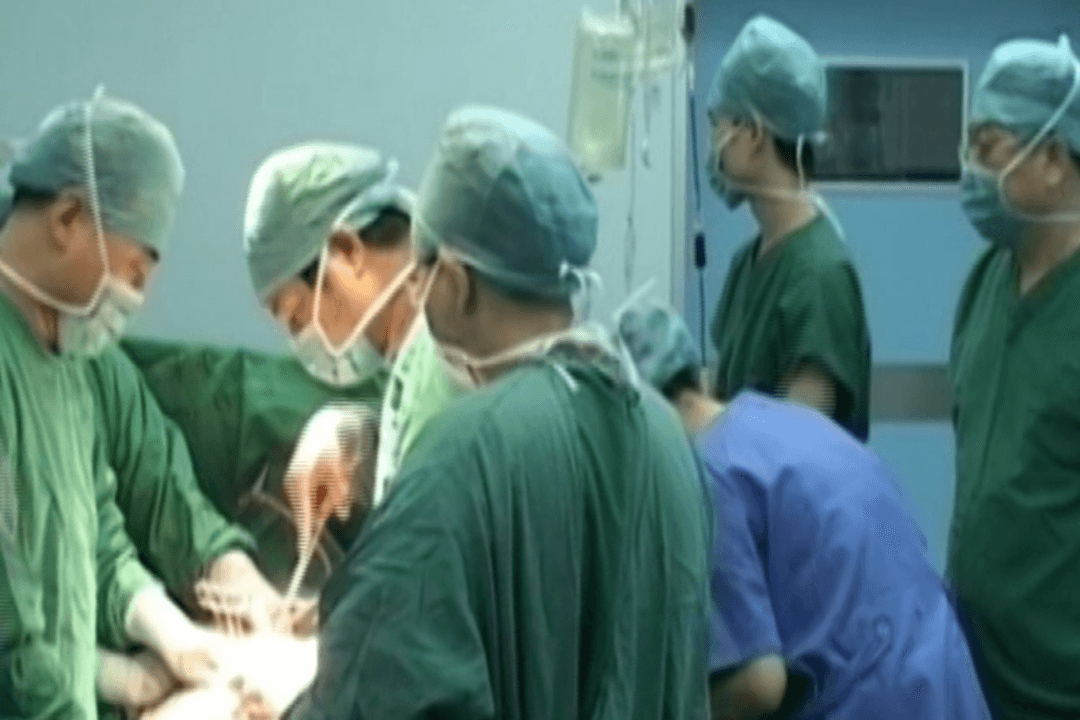[xtypo_dropcap]D[/xtypo_dropcap]r. Dana Churchill, Los Angeles representative for Doctors Against Forced Organ Harvesting (DAFOH), discussed organ harvesting with The Epoch Times and also, efforts to establish ethical and regulatory guidelines to protect the public from abusive and trafficking practices.
Organ donation, as understood by most established transplant institutions worldwide, is the procedure in which an organ donor makes an informed and active decision free from coercion and in a clear mental state.
DAFOH aims to provide the medical community and the rest of society with objective findings of unethical and illegal organ harvesting. It considers any form of organ removal that jeopardizes the donor’s life and welfare, or which ends a donor’s life in order to obtain an organ for transplantation or other reason, to be unethical organ harvesting.
Churchill said, “Education is the key to stopping what has grown into a booming business in organ harvesting.”
According to Organdonor.gov, there are over 108,000 people in the United States on an organ transplant waiting list while there were only 14,140 transplants completed from January through June 2010. When the demand for organs far surpasses the supply, people look beyond their country’s borders for help, which is referred to as transplant tourism.
In the United States, the average wait for a kidney or a lung is about three years, according to the U.S. Department of Health and Human Services. The average wait for a liver is just over two years.
In contrast, the wait for a kidney, liver, heart, or corneas in China is between one week and one month.
In a press conference on Dec. 22, 2010, former transplant surgeon, Dr. Eric Goldberg, said that tens of thousands, even more than 100,000 organ donors would need to constitute an “organ bank” in order to create such rapid organ availability.
An ethical question raised by DAFOH is how such a large organ supply is available in China, where the culture is averse to organ donation. Although an organ donor system was established in China in August 2009, according to the People’s Daily, before then a paltry 130 people had signed up to donate their organs since 2003.
China’s minister of Health, Huang Jiefu, said in 2005 that 95 percent of all organ transplants come from executed prisoners.
The numbers just don’t add up, however, according to former Canadian Secretary of State, David Kilgour, and international human rights lawyer, David Matas, who have investigated organ harvesting in China. The number of death row prisoners executed remains fairly similar each year, while the number of organ transplants has increased.
Although the exact number of prisoners executed in China and given death sentences is considered a “state secret,” Amnesty International’s annual report provides estimates that between 400 and 2,500 prisoners are killed annually.
These numbers cannot account for the large organ bank needed to provide organs virtually “to order.”
Kilgour and Matas’s investigation found that, of the 90,000 transplants that took place between 1999 and 2005, after taking into consideration executed prisoners and other explained sources, there were 41,500 estimated transplants whose source could not be determined. Kilgour and Matas believe Falun Gong practitioners, who would be killed in the process of harvesting their organs, are the most likely source for these organs. Falun Gong is an ancient spiritual practice, based on the principles of truthfulness, compassion, and tolerance.
In November 2009, Kilgour and Matas published Bloody Harvest: The Killing of Falun Gong for their Organs, which includes 52 pieces of evidence that support allegations that Falun Gong practitioners in China’s labor camps and detention centers, account for the increase in organ transplants in the past 10 years and provide the massive organ bank that makes organs for sale in China readily available.
DAFOH and the authors of Bloody Harvest feel compelled to inform medical communities and governments worldwide about their findings and recommendations.
In an Aug. 31, 2010, speech delivered to a United Nations conference held in Australia, David Kilgour gave 15 recommendations to prevent organ transplant abuse in China, one of which is for parliaments to pass extraterritorial legislation banning transplant tourism.
“Belgian Senator Patrik Vankrunkelsven and Canadian Member of Parliament Borys Wrzesnewskyj has each introduced into the Parliament of his country extraterritorial legislation banning transplant tourism. The proposed legislation would, when enacted, penalize any transplant patient who receives an organ without consent of the donor where the patient knew or ought to have known of the absence of consent,” Kilgour said.
On Oct. 19, 2010, Valerie Boyer, a member of the French National Assembly, introduced a motion that would require French residents who go to other countries for organ transplants to provide proof of the source of those organs.
Organ donation, as understood by most established transplant institutions worldwide, is the procedure in which an organ donor makes an informed and active decision free from coercion and in a clear mental state.
DAFOH aims to provide the medical community and the rest of society with objective findings of unethical and illegal organ harvesting. It considers any form of organ removal that jeopardizes the donor’s life and welfare, or which ends a donor’s life in order to obtain an organ for transplantation or other reason, to be unethical organ harvesting.
Churchill said, “Education is the key to stopping what has grown into a booming business in organ harvesting.”
Organ Transplant Numbers Don’t Add Up in China
According to Organdonor.gov, there are over 108,000 people in the United States on an organ transplant waiting list while there were only 14,140 transplants completed from January through June 2010. When the demand for organs far surpasses the supply, people look beyond their country’s borders for help, which is referred to as transplant tourism.
In the United States, the average wait for a kidney or a lung is about three years, according to the U.S. Department of Health and Human Services. The average wait for a liver is just over two years.
In contrast, the wait for a kidney, liver, heart, or corneas in China is between one week and one month.
In a press conference on Dec. 22, 2010, former transplant surgeon, Dr. Eric Goldberg, said that tens of thousands, even more than 100,000 organ donors would need to constitute an “organ bank” in order to create such rapid organ availability.
An ethical question raised by DAFOH is how such a large organ supply is available in China, where the culture is averse to organ donation. Although an organ donor system was established in China in August 2009, according to the People’s Daily, before then a paltry 130 people had signed up to donate their organs since 2003.
China’s minister of Health, Huang Jiefu, said in 2005 that 95 percent of all organ transplants come from executed prisoners.
The numbers just don’t add up, however, according to former Canadian Secretary of State, David Kilgour, and international human rights lawyer, David Matas, who have investigated organ harvesting in China. The number of death row prisoners executed remains fairly similar each year, while the number of organ transplants has increased.
Although the exact number of prisoners executed in China and given death sentences is considered a “state secret,” Amnesty International’s annual report provides estimates that between 400 and 2,500 prisoners are killed annually.
These numbers cannot account for the large organ bank needed to provide organs virtually “to order.”
Kilgour and Matas’s investigation found that, of the 90,000 transplants that took place between 1999 and 2005, after taking into consideration executed prisoners and other explained sources, there were 41,500 estimated transplants whose source could not be determined. Kilgour and Matas believe Falun Gong practitioners, who would be killed in the process of harvesting their organs, are the most likely source for these organs. Falun Gong is an ancient spiritual practice, based on the principles of truthfulness, compassion, and tolerance.
In November 2009, Kilgour and Matas published Bloody Harvest: The Killing of Falun Gong for their Organs, which includes 52 pieces of evidence that support allegations that Falun Gong practitioners in China’s labor camps and detention centers, account for the increase in organ transplants in the past 10 years and provide the massive organ bank that makes organs for sale in China readily available.
What Can Be Done?
DAFOH and the authors of Bloody Harvest feel compelled to inform medical communities and governments worldwide about their findings and recommendations.
In an Aug. 31, 2010, speech delivered to a United Nations conference held in Australia, David Kilgour gave 15 recommendations to prevent organ transplant abuse in China, one of which is for parliaments to pass extraterritorial legislation banning transplant tourism.
“Belgian Senator Patrik Vankrunkelsven and Canadian Member of Parliament Borys Wrzesnewskyj has each introduced into the Parliament of his country extraterritorial legislation banning transplant tourism. The proposed legislation would, when enacted, penalize any transplant patient who receives an organ without consent of the donor where the patient knew or ought to have known of the absence of consent,” Kilgour said.
On Oct. 19, 2010, Valerie Boyer, a member of the French National Assembly, introduced a motion that would require French residents who go to other countries for organ transplants to provide proof of the source of those organs.



